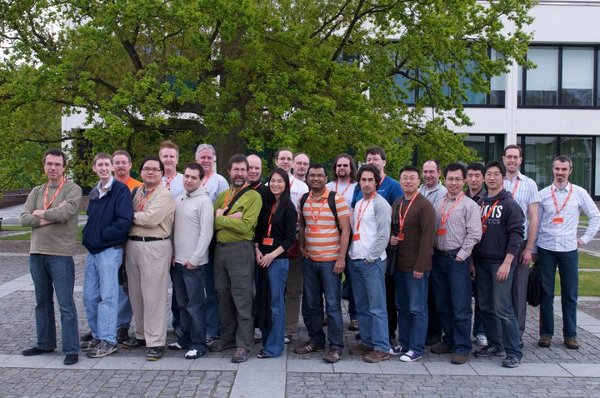Development Update
Nine weeks until release and one thing is clear already: 12.04 will be a kick-arse release. Thanks everyone for your hard work on it! Still there’s a few things which still need to get done. Today User Interface Freeze and Beta Freeze will kick in, next week we will do a test rebuild of the whole archive and Beta 1 will get out next week as well.
This week has seen a number of interesting changes: users of SandyBridge systems will have rejoiced to hear that RC6 was enabled by default. Unity 5.4.0 landed with many bug fixes and bringing us the HUD.
Letting Ubuntu developers speak for themselves
Kees Cook found CVEs (Common Vulnerabilities and Exposures entries) dating back to 1903.
Martin Pitt wrote a script to identify causes for power drain, be sure to check it out.
Calum Pringle updated us on the new Sound theme for 12.04.
Jeremy Bicha updated us on transmission 2.50.
Ricardo Salveti was interviewed about Ubuntu TV running on ARM hardware on Demo Friday at Linaro Connect.
Events
Ubuntu Global Jam
Next week we will celebrate the Ubuntu Global Jam. On the weekend of 2nd-4th March LoCo teams around the globe will come together and make Ubuntu better together. If you and your Ubuntu friends want to join in, check out the the video to find out how to set up an event. Currently we have events in these countries: Myanmar, Australia, Czech Republic, Italy, Slovenia, Spain, Mexico, Canada, USA and Brazil. Go and add yours today.
FixIt Fridays!
From this week onwards we are going to hold FixIt Fridays every week until release. Check out the spotlight section below for more info.
Things which need to get done
If you want to get involved in packaging and bug fixing, there’s still a lot of bugs that need to get fixed:
- Also did John Lea from the Ubuntu Design team talk to us and mentioned that there are bugs up for grabs, where the design has been decided on and the implementation might need YOUR help. If you want to help improve Ubuntu’s UI, have a look at these!
First timers!
We had a number of folks getting their first uploads into Ubuntu again! Julian Edwards and David Callé both got some new packages into Ubuntu. Glenn Aaldering requested a sync. Keep up the good work everyone!
Natalia Bidart received upload rights for the Ubuntu One packages! Well done!
Spotlight: FixIt Fridays!
Right now it’s quite easy to see that a single fix which gets into Ubuntu benefits millions of users. Also with the next release being an LTS there will be many many more users.
If you always felt like you should give back to Ubuntu one day, if you play around with source code now and then or just liked the idea of getting involved in Ubuntu somehow, now is the perfect time.
First of all: we are slowly approaching Beta 1 of Ubuntu 12.04, so there are still around 9 weeks left until release. Also is the release getting more and more stable, so upgrading now is not totally reasonable any more.
Secondly: the Ubuntu developers are coming together in #ubuntu-motu on Freenode every Friday to hang out with you, answer all your questions and help you get started with Ubuntu Development.
What you need to do? Easy:
- Check out the first few articles of the Ubuntu Packaging Guide.
- Join #ubuntu-motu on Freenode. (You can use webchat, if you don’t have an IRC client installed)
- Find a few simple bugs, ask your questions and make Ubuntu better!
Don’t be shy, give the docs a try, let us know what you think, ask your questions, join us – we are going to have a great time, every Friday until release!
Spotlight: Ubuntu Kernel Team
We had a chat with the Ubuntu Kernel Release Manager for Canonical, Leann Ogasawara.
What is your team working on this cycle?
With Ubuntu 12.04 being an LTS release, our primary focus has been on stability. As such, we chose to ship with a v3.2 based kernel and will continue to rebase to the latest v3.2.y stable kernels as they become available. Along with this we have also been conducting an extensive
kernel config review to ensure options have been enabled/disabled in accordance to our standard policy, any exceptions have been documented, and any changes have been incorporated to bring consistency across all architectures and flavors. We’ve also been looking to provide an improved Power Management story and have dedicated a few resources to investigate, isolate, and implement some power saving strategies.
A portion of the team has also been focused on helping maintain kernels for previous Ubuntu releases. They have streamlined the SRU process into a 3 week cadence with a strong focus on elimination of regressions through enforcement of a strict QA and bug verification policy and
process.
What is your development process like compared to other teams? I hear your team uses Git?
We do use a different version control system, ie git, when compared to what many other teams use, ie bzr. However, our overlying processes and procedures are relatively the same compared to other teams. We openly communicate our plans or raise topics of interest via the mailing lists, discuss and submit patches for features or bug fixes, use launchpad to monitor incoming defects/requests, and perform routine uploads to the archive to provide the latest improvements during the development cycle. I would think most other teams have a very similar process and procedure.
What kind of improvements will we see in 12.04 when it comes to the Kernel?
One big improvement we hope to see is in regards to Power Management. We’re currently prototyping some patches for Sandy Bridge users which could equate an improved power usage of 40%-60%. We set up a wiki page with more information.
An improved set of jack detection patches from the upstream v3.3 kernel has also been backported. This lays the foundation for improvements such as successfully having different volumes for headphones and speakers and also having media keys control both headphone volume when headphones are plugged in and speakers when they are not.
Another big change is the consolidation of the generic and server flavors in an effort to help minimize the maintenance burden over the life of this LTS release. We also saw the emergence of an armhf supported flavor.
The Ubuntu 12.04 kernel also carries the latest overlayfs updates. Any users which were previous consumers of aufs have been encouraged to migrate over to overlayfs. We have yet to hear of any complaints of overlayfs not satisfying the requirements/needs which were previously met by aufs.
The above are just a few highlights of the upcoming Ubuntu 12.04 kernel. As always, there are also numerous bug fixes and support for new hardware.
Can community members contribute to the Kernel Team? How do they get started?
Any support or participation from the community is always welcome. It’s best to first determine where someone would want to help out. If someone is not even sure where they would like to lend their support, we can always provide suggestions. Some examples include testing of the
latest -proposed kernels for regressions, triaging bugs, and submitting patches. Feel free to get in contact with us either on IRC (FreeNode #ubuntu-kernel) or through our Ubuntu kernel-team mailing list. We’ll be happy to help anyone get started.
Has your team had any other notable developments? Changes in roles or new members?
We have had a few Canonical employees hired on to help with the Ubuntu kernel. For example, Joe Salisbury is our new dedicated Defect Analyst for the kernel. We also reacquired the very talented Colin King who has been spear heading the investigation into Power Management improvements. We have also been receiving some brilliant triaging work from Julian Wiedmann. None of us have ever met Julian, but he has been doing some fantastic work with a lot of our kernel bugs.
What is your number one goal this cycle?
I think it goes without saying that because Ubuntu 12.04 will be an LTS release, our number one goal is stability. If we’re able to deliver some extra improvements such as power savings, that’s an added bonus.

Ubuntu Kernel Team at UDS-M in Brussels
Get Involved
- Read the Introduction to Ubuntu Development. It’s a short article which will help you understand how Ubuntu is put together, how the infrastructure is used and how we interact with other projects.
- Follow the instructions in the Getting Set Up article. A few simple commands, a registration at Launchpad and you should have all the tools you need, and you’re ready to go.
- Check out our instructions for how to fix a bug in Ubuntu, they come with small examples that make it easier to visualise what exactly you need to do.
Find something to work on
Pick a bitesize bug. These are the bugs we think should be easy to fix. Another option is to help out in one of our initiatives.
In addition to that there are loads more opportunities over at Harvest.
Getting in touch
There are many different ways to contact Ubuntu developers and get your questions answered.
![]()
![]() Except where otherwise noted, content in this issue is licensed under a Creative Commons Attribution 3.0 License BY SA Creative Commons License
Except where otherwise noted, content in this issue is licensed under a Creative Commons Attribution 3.0 License BY SA Creative Commons License
